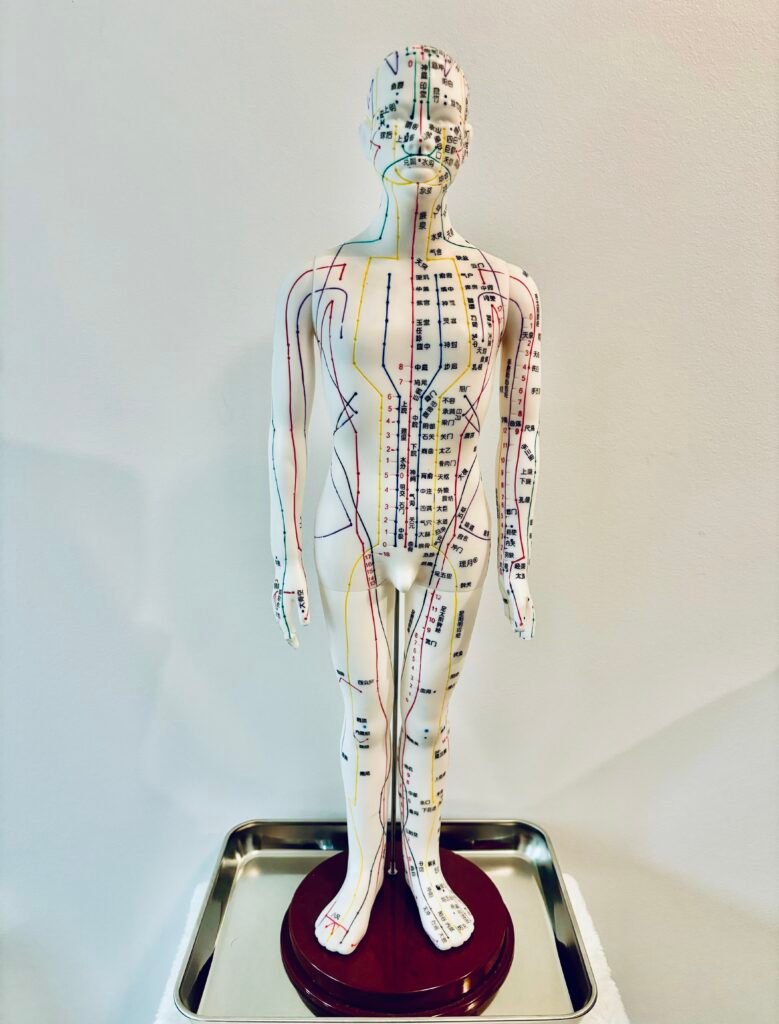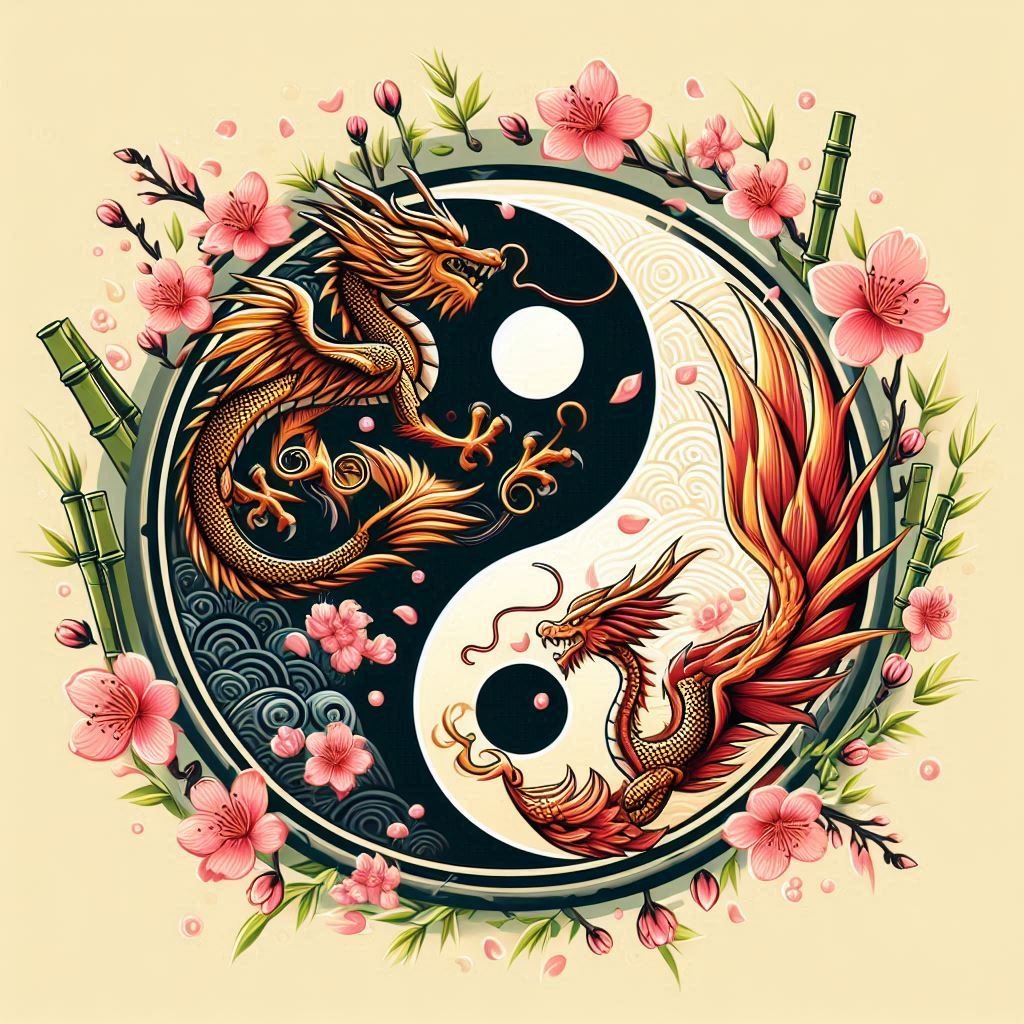Concepts of Traditional Chinese Medicine (TCM)
In Chinese medicine, several foundational concepts help explain how our habits impact our health:

Meridians (Jing Luo)
Meridians are pathways in the body through which Qi (vital energy) flows. They are organized into two main systems:
- Eight Irregular Meridians (Extraordinary Vessels):
- Chong Mai (Penetrating), Du Mai (Governing), Ren Mai (Conception), Dai Mai (Belt), Yin Wei Mai (Yin Linking), Yang Wei Mai (Yang Linking), Yin Qiao Mai (Yin Heel), Yang Qiao Mai (Yang Heel).
- Twelve Regular Meridians:
- Lung, Large Intestine, Stomach, Spleen, Heart, Small Intestine, Bladder, Kidney, Pericardium, Sanjiao (Triple Burner), Gall Bladder, and Liver channels.
These pathways connect the body’s surface to internal organs, facilitating the circulation of Qi and blood. Blockages or imbalances in the meridians can lead to various health issues.
Five Elements (Wu Xing)
The Five Elements—Wood, Fire, Earth, Metal, and Water—are a foundational theory in Chinese medicine. Each element is associated with specific organs, emotions, seasons, and other aspects of life. The balance and interaction among these elements are crucial for maintaining health.
| Element | Zang Organ | Fu Organ | Sense | Emotion | Flavor | Color | Season | Climate | Tissue |
|---|---|---|---|---|---|---|---|---|---|
| Wood | Liver | Gallbladder | Sight | Anger | Sour | Green | Spring | Wind | Sinews |
| Fire | Heart | Small Intestine | Speech | Joy | Bitter | Red | Summer | Heat | Vessels |
| Earth | Spleen | Stomach | Taste | Worry | Sweet | Yellow | Late Summer | Damp | Muscles |
| Metal | Lung | Large Intestine | Smell | Grief | Pungent | White | Autumn | Dryness | Skin |
| Water | Kidney | Bladder | Hearing | Fear | Salty | Black | Winter | Cold | Bones |
This table illustrates how traditional Chinese medicine integrates different aspects of nature and the human body into a holistic health system.
Zang-Fu Theory
This theory categorizes organs into Zang (solid) and Fu (hollow) organs. Zang organs (heart, liver, spleen, lungs, kidneys) store fundamental substances like Qi, blood, and essence. Fu organs (stomach, intestines, gallbladder, bladder) are involved in the transformation and transportation of food and waste. Health depends on the harmonious function of these organs.

Yin-Yang Theory
Health is seen as a dynamic balance between Yin and Yang, the two opposing but complementary forces. Imbalances between Yin and Yang can lead to disease.
Yin is a fundamental concept in Chinese philosophy and medicine representing passive, feminine, dark and cool energy. In health, Yin is associated with an internal process, nourishment, rest, and conservation of the body. Imbalances in Yin can lead to symptoms such as dryness, insomnia, and restlessness.
Yang is the complementary opposite of Yin and represents active, masculine, bright, warm energy and external process. In Chinese medicine, Yang is related to external process, activity, movement, and body heat. An imbalance of Yang can result in symptoms like hyperactivity, fever, and inflammation.
Qi (or Chi)
Qi is the vital energy or life force that circulates within all living beings. It influences the functioning of organs, blood circulation, and mental well-being. Blockages or deficiencies in Qi can lead to fatigue, illnesses, and organ dysfunctions.
Essence (Jing)
Jing is a fundamental substance inherited from one’s parents, crucial for growth, development, and reproduction. It is stored in the kidneys and slowly consumed throughout life. Preserving Jing is essential for longevity and vitality. Depletion of Jing can lead to weakness, premature aging, and other health problems.

Spirit (Shen)
Shen, or mind, is considered one of the Three Treasures (San Bao), alongside Qi and Jing. Shen is housed in the heart and is responsible for consciousness, mental functions, and emotional health. A harmonious Shen is reflected in mental clarity and emotional stability, while disturbances can lead to anxiety, depression, and other psychological issues.
Blood (Xue)
Blood is a vital substance that nourishes the body and maintains mental and emotional well-being. It is closely linked to Qi, as Qi moves Blood, and Blood nourishes Qi. Disorders related to Blood include Blood deficiency, Blood stasis, and Blood heat, each presenting different symptoms and requiring specific treatments.
Internal Dampness
Internal Dampness describes an imbalance characterized by the retention of excess fluids or moisture. This can manifest as heaviness, fatigue, digestive issues, and congestion, affecting overall health.
Integrating Concepts into a Holistic Health System
These concepts are integral to diagnosing and treating health conditions in traditional Chinese medicine, emphasizing a holistic approach to wellness that considers the interconnections between mind, body, and environment.
